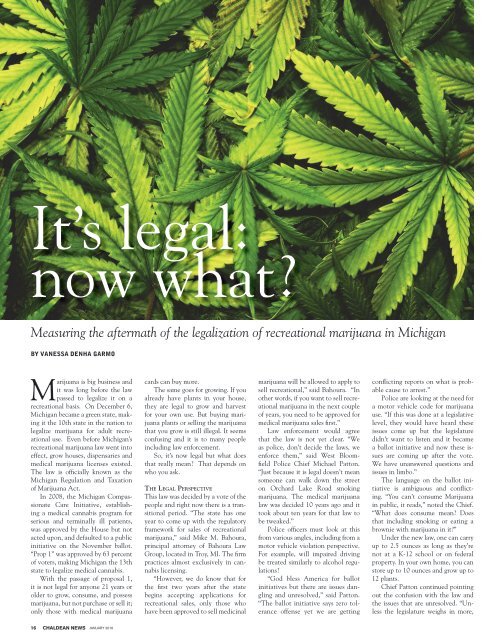JANUARY 2019
Create successful ePaper yourself
Turn your PDF publications into a flip-book with our unique Google optimized e-Paper software.
It’s legal:<br />
now what?<br />
Measuring the aftermath of the legalization of recreational marijuana in Michigan<br />
BY VANESSA DENHA GARMO<br />
Marijuana is big business and<br />
it was long before the law<br />
passed to legalize it on a<br />
recreational basis. On December 6,<br />
Michigan became a green state, making<br />
it the 10th state in the nation to<br />
legalize marijuana for adult recreational<br />
use. Even before Michigan’s<br />
recreational marijuana law went into<br />
effect, grow houses, dispensaries and<br />
medical marijuana licenses existed.<br />
The law is officially known as the<br />
Michigan Regulation and Taxation<br />
of Marijuana Act.<br />
In 2008, the Michigan Compassionate<br />
Care Initiative, establishing<br />
a medical cannabis program for<br />
serious and terminally ill patients,<br />
was approved by the House but not<br />
acted upon, and defaulted to a public<br />
initiative on the November ballot.<br />
“Prop 1” was approved by 63 percent<br />
of voters, making Michigan the 13th<br />
state to legalize medical cannabis.<br />
With the passage of proposal 1,<br />
it is not legal for anyone 21 years or<br />
older to grow, consume, and possess<br />
marijuana, but not purchase or sell it;<br />
only those with medical marijuana<br />
cards can buy more.<br />
The same goes for growing. If you<br />
already have plants in your house,<br />
they are legal to grow and harvest<br />
for your own use. But buying marijuana<br />
plants or selling the marijuana<br />
that you grow is still illegal. It seems<br />
confusing and it is to many people<br />
including law enforcement.<br />
So, it’s now legal but what does<br />
that really mean? That depends on<br />
who you ask.<br />
The Legal Perspective<br />
This law was decided by a vote of the<br />
people and right now there is a transitional<br />
period. “The state has one<br />
year to come up with the regulatory<br />
framework for sales of recreational<br />
marijuana,” said Mike M. Bahoura,<br />
principal attorney of Bahoura Law<br />
Group, located in Troy, MI. The firm<br />
practices almost exclusively in cannabis<br />
licensing.<br />
“However, we do know that for<br />
the first two years after the state<br />
begins accepting applications for<br />
recreational sales, only those who<br />
have been approved to sell medicinal<br />
marijuana will be allowed to apply to<br />
sell recreational,” said Bahoura. “In<br />
other words, if you want to sell recreational<br />
marijuana in the next couple<br />
of years, you need to be approved for<br />
medical marijuana sales first.”<br />
Law enforcement would agree<br />
that the law is not yet clear. “We<br />
as police, don’t decide the laws, we<br />
enforce them,” said West Bloomfield<br />
Police Chief Michael Patton.<br />
“Just because it is legal doesn’t mean<br />
someone can walk down the street<br />
on Orchard Lake Road smoking<br />
marijuana. The medical marijuana<br />
law was decided 10 years ago and it<br />
took about ten years for that law to<br />
be tweaked.”<br />
Police officers must look at this<br />
from various angles, including from a<br />
motor vehicle violation perspective.<br />
For example, will impaired driving<br />
be treated similarly to alcohol regulations?<br />
“God bless America for ballot<br />
initiatives but there are issues dangling<br />
and unresolved,” said Patton.<br />
“The ballot initiative says zero tolerance<br />
offense yet we are getting<br />
conflicting reports on what is probable<br />
cause to arrest.”<br />
Police are looking at the need for<br />
a motor vehicle code for marijuana<br />
use. “If this was done at a legislative<br />
level, they would have heard these<br />
issues come up but the legislature<br />
didn’t want to listen and it became<br />
a ballot initiative and now these issues<br />
are coming up after the vote.<br />
We have unanswered questions and<br />
issues in limbo.”<br />
The language on the ballot initiative<br />
is ambiguous and conflicting.<br />
“You can’t consume Marijuana<br />
in public, it reads,” noted the Chief.<br />
“What does consume mean? Does<br />
that including smoking or eating a<br />
brownie with marijuana in it?”<br />
Under the new law, one can carry<br />
up to 2.5 ounces as long as they’re<br />
not at a K-12 school or on federal<br />
property. In your own home, you can<br />
store up to 10 ounces and grow up to<br />
12 plants.<br />
Chief Patton continued pointing<br />
out the confusion with the law and<br />
the issues that are unresolved. “Unless<br />
the legislature weighs in more,<br />
16 CHALDEAN NEWS <strong>JANUARY</strong> <strong>2019</strong>

















